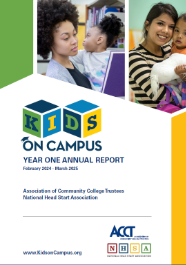ACCT and National Head Start Association (NHSA) released the Year One Progress Report of its Kids on Campus project to advance student-parent success and the school readiness of young children from families with low incomes by bringing more Head Start child care centers to more community college campuses. The five-year initiative aims to establish at least 50 such programs by 2030.
Kids on Campus is supported by ECMC Foundation, Imaginable Futures, Lumina Foundation, the Annie E. Casey Foundation, Trellis Foundation, Crimsonbridge Foundation, and Seldin Haring-Smith Foundation.
The core philosophy of the project is rooted in two of the most effective strategies for reducing poverty: providing high-quality early care and learning for young children and supporting parents through education and training that will advance their career goals. That’s where Kids on Campus comes in.
The report details why ACCT and NHSA are doing this important work, progress to date, next steps, and how community colleges and Head Start centers can get involved. So far:
- 87 community colleges and 98 Head Starts have taken the initial step in connecting and engaging with Kids on Campus.
- The partners have found 18 potential matches between community colleges and Head Start programs interested in exploring partnerships.
- Two new Kids on Campus partnerships launched in Fall 2024 and a third is set to open in late spring 2025.
“Kids on Campus is off to a strong start,” said ACCT Vice President for Public Policy Carrie Warick-Smith. “During Year one, we’ve sown the seeds of progress. Over the next several years, Kids on Campus will continue to push our initiative forward— building on outreach efforts to leaders at community college campuses and Head Start programs, increasing engagement, bridging connections and nurturing opportunities for networking and learning, and creating and providing technical assistance and support.”
Kids on Campus partnerships between community colleges and Head Start programs bring significant value to campuses, with positive impacts across multiple stakeholders.
“Head Start programs that partner with community colleges benefit in many ways,” said NHSA Senior Director of Data Victoria Jones. “Among these are financial and budget implications that allow the reinvestment of funds into programming, connection to campus departments and resources for practicum experiences, and access to classroom space, plus operational and infrastructure support.”
“The benefits to community colleges and their students are many,” said ACCT Center for Policy and Practice Associate Vice President Steve Jurch. “On-campus Head Start programs increase colleges’ capacities to support students’ basic needs. They support enrollment, persistence, and completion among eligible students. And they offer access to a high-quality early learning program for students’ children, which encourages generational emphasis on education that can lead to better financial futures for those in the community through free, high-quality early learning opportunities and access to additional resources for family members.”
ACCT and NHSA invite community colleges, Head Start centers, and philanthropic supporters interested in transforming the lives of families to reach out to [email protected].
